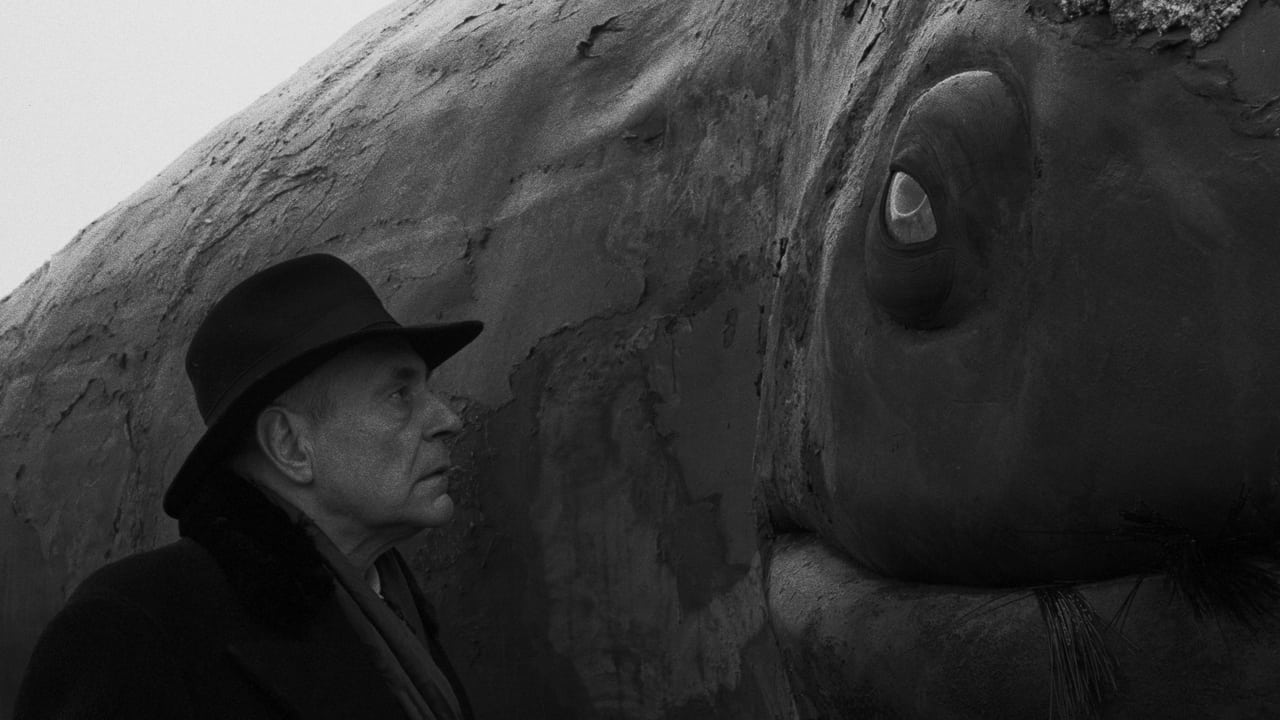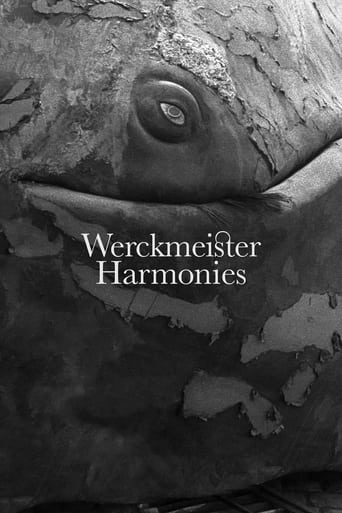

I appreciate the previous review explaining the movie's similarities to Buddhist emptiness and discussing Mizoguchi's influences but the incredibly slow pace of the movie and incredibly long takes made me press the FF button of my DVD player and believe me it happens extremely rarely. There are many other excellent artistic movies with a slow pace e.g. Institute Benjamenta but their "magic" makes us watch them with constant interest. OK, there is a rhythm in the Wreckmeister's long takes and there is a visual magnetism of black and white presentation of a poor little town but the monotonous film lasts for much too long- much too long- much too long- (and so on for 141 minutes). Well, no to be totally critical, there is a clear advantage of such movie structure- you can safely take a toilet break or bring a cup of tea from your kitchen and when you are back... they are still walking (and walking, and walking).
... View MoreHow to engage emptiness, visually? This is the most tasking difficulty that I know of in film, for both the filmmaker and viewer. You cannot merely look - sitting still is not meditation - it needs to be a particularly sharpened but effortless way of looking. Seeing things without the person that sees obscuring the view.Only the Buddhist have adequately solved this to my mind, by tying into an actual practice of purging the self so that we got a work, a painting, poem or flower arrangement, that was itself an act of meditation. But they had centuries ahead of them to refine. In film, I can always count on Bela Tarr for a vision of formative emptiness, and ways to engage that emptiness as a space for contemplation. No doubt he has studied Mizoguchi for the 'mono no aware' of a transient sorrowful world, itself derived from the Buddhist eye. And even more Tarkovsky, in more explicitly adopting his omniscient camera for the reflections. The gloomy darkness he surrounds it with no doubt comes from Eastern Europe as churned from the broken machinery of decades old communism. It is implicit in everything he does, always iron cast in punishing ways. At least this part doesn't require any more comments I feel. The impressions of abstract horror are from a life lived.So it is a dark world rolling into the night that we are given here, from the memory of it, a kind of nightbound universe. How to struggle from our end? Why, most importantly, why even admire the great whale, if the whole is nothing?Of course, it is nothing less than simple honesty on Tarr's part for presenting a world as he does, as we know historically up to now. For the most, it is the Prince that humanity has been the most eager to hear, someone to incite change. There is no time to see the great whale whose body encompasses the world, the wonder of that emptiness that can generate form of such awesome beauty. The only thing that has power to halt the rampaging mob then is a vision of their own mortality.So in several ways, one is tempted to imagine a kinship between him and Trier; an encounter with the void, and human wretchedness in the face of that encounter. But I posit Tarr to be a wiser filmmaker, especially here.Look how he opens the film for example, a magnificent round-up even more pertinently addressing now, our microcosmic cycle mirrored from above, with humans dancing into position of the spheres. This is a filmmaker who understands. The only problem; the Nietzchean dismay he seems to have resigned himself to. The last bit of news is that he has decided to stop making films altogether. His worldview is a bleak one, no doubt.But it's an honest dismay, a way of confessing that he knows there will be light again in principle but can't seem to see any. It's a profoundly human despair, how he wearily examines the broken whale at the end. So the problem remains, one of embodying a world where, by simply existing, we are negations of that primal void. Isn't that what we're taught? So how to embrace the great whale then?The film ends here. It falls on us to see beyond the dark, and see if we can embrace the whale by seeing that the whole and nothing is the one.
... View MoreWhen I first watched this movie, I was rendered speechless by the sheer perfection. I was desperately trying to find flaws in it, but failed. This movie is artistically perfect and that's it.Every scene, even the scenes where Janos is just walking around town, is a masterpiece in its own right. The choreography of the camera and the use of shadows are pure genius. Bela Tarr is a true poet of contemporary cinema, conjuring images of unparalleled somber beauty. For me, this movie ranks among my favorite movies of all time, along with the masterpieces of Angelopoulos, Tarkovsky, Kurosawa and Bergman.Hungary teaches us how cinema should be made. The world had better listen carefully.
... View More"I'm a man with a huge world-view, surrounded by microbes." – Woody Allen Bela Tarr directs "Werckmeister Harmonies". The plot? A circus act, consisting of a giant whale and a special guest called "The Prince", arrives at a small Hungarian town. With the circus comes a palpable sense of impending doom. Pretty soon, local townsfolk kick-start a violent uprising. They seem compelled by invisible, magical forces. One man, Janos Valuska, observes these mysterious proceedings with fascination. A figure of innocence and perhaps naivety, Janos watches as the circus causes violent gangs to form, some taking advantage of the situation and seizing power, others attempts to restore "order and cleanliness".The film begins with a beautiful sequence. Janos enters a bar and persuades a group of drunks to create a model of the solar system. Dancing in circles the gang reenact a solar eclipse, a ballet which is beautiful until one looks closely. The participants are all drunk and in a state of mental confusion, readily believing Janos' apocalyptic description of a solar eclipse. To Janos, an eclipse is not a scientific event, but a quasi-religious one which heralds the end of mankind. Instead of rational explanation, Janos and his congregation thus cling to irrationality and superstition. Later, when Janos sees the giant whale up close, he attributes its presence to God; surely only a powerful, supernatural being could create such a funny creature.Tarr then uses the whale as a metaphor for a kind of irrational, medieval superstition akin to blind, fascist obedience. No one in the film even considers taking a closer look at the whale, for if they had they would have noticed "The Prince" hidden behind it, a shadowy leader who represents nothing but an image onto which anyone can project whatever ideals they wish.Midway in the film, Janos overhears his uncle talking about Andreas Werckmeister, a musician famous for dividing the octave into twelve half-step tones. Werckmeister believed that maths, music and astronomy were linked manifestations of the harmony of the universe, a view held by Pythagoras, who argued that most euphonious harmonies resulted from tones that reflected the proportions of simple integers (2:1, 3:2 etc). But basing musical scales on simple ratios leads to contradictions and octaves that aren't true, which led to people like Werckmeister (and others) seeking to find an "equal temperament" or some form of "new musical system".By adopting this new system, Janos' uncle believes that mankind has deprived musical instruments of their divine tuning, replacing it with an artificial system which is nothing but an illusion; an illusion which western music is based on. Werckmeister is thus a sort of Promethian figure, taking the gift of knowledge/music away from God and handing it down to men.Janos' uncle thus believes that music, and by extension life itself, was better when it belonged solely to God. He longs for a simpler universe ruled by a sovereign Master Figure, and fails to acknowledge the vast achievements developed under the Werckmeister scale. As a musicologist he fails to appreciate the higher level of organisation and harmonies which "man's creation" has led to.The film's treatment of "order", "chaos", "anarchy" and "civilization", are thus reduced to musical terms; a three-way battle between order and symmetry (the unified world-view of classical Greece and the Middle Ages), superstition and mysticism and a more nuanced blending of the two. Consider again the first scene, in which Janos attempts to create heavenly order using the drunken bums. The bums fumble about, irregular in their movements, always falling out of position...and yet they are supremely beautiful, spinning in circles whilst the camera pulls back and the music swells. For Tarr, all quests for perfection must take into consideration humanity's imperfections; harmony depends on imprecision and compromise.But Tarr makes a larger point. Late in the film we're introduced to a gun waving police chief, his dictatorial children and his lover, a woman who seeks to use the escalating chaos of the village to acquire more power. Using these characters, and various symbolic sequences, Tarr then sketches a political allegory about the fascist's quest for order, and fascism's unstoppable tilt toward collapse.Hungary became a "Communist" (or rather, state capitalist) state after World War 2, the Soviet Union maintaining a military presence and enforcing Stalinist principles. This led to a revolt in 1956, which helped to topple authoritarianism and give birth to a kind of mixed ideology Socialism, a greatly liberalised approach to communism that lasted until 1989 (upon which democratic government and capitalism became the norm). But the film is not a strict allegory of Hungarian history, rather it aims to show how one political ideology can replace another when an aimless populace irrationally follows a charismatic demagogue. It is about how reactionary opportunists exploit superstition to gain power in the name of order, how people obsessed with "order" have contributed to disturbing the harmonic "disorder" of things and how impotent members of the intelligentsia often sit on the sidelines whilst the world burns. Indeed, it's no surprise that the first thing the violent gang does in the film is to raid a hospital, destroying scientific equipment in a crazy rage. With science dead they become slaves to lies; an irrational force, an angry mob which is only halted by the sight of a naked old man. This man, his body frail, his bones protruding from his flesh, forces them to confront a mass of paradoxes. Humbled and disgusted, they retreat into the night. But the damage has already been done. The old order has been destroyed and a new era has begun, Janos, the boy who believed in apocalyptic whales and the mysterious beauty of god, ending the film in a sterile hospital ward, misdiagnosed by science and branded an insane criminal.8.9/10 – Though comprised of only 39 shots, this is perhaps Tarr's most accessible film.
... View More